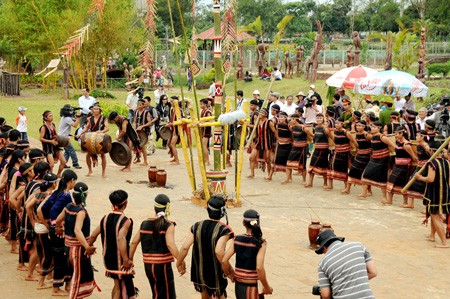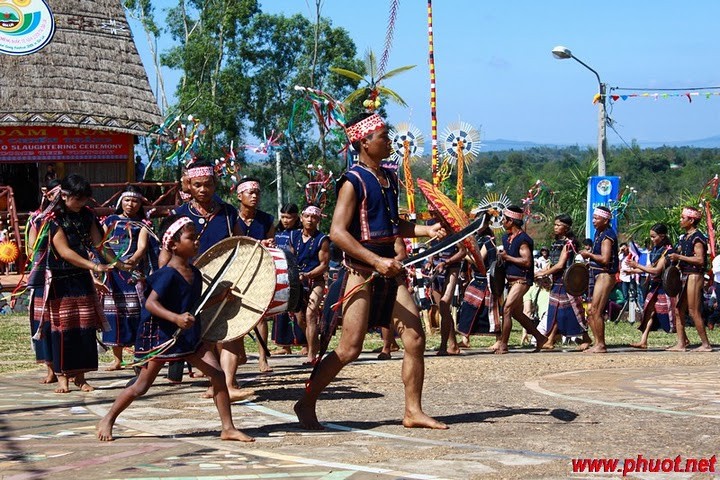(VOVworld) – The M’nong have maintained many traditional customs which have helped enhance their communal bond.

A "Neu" tree planting ceremony of the M'nong to welcome the new year
|
The M’nong have many branches living mainly in Dac Nong, Dac Lac, Binh Phuoc, and Lam Dong province. Luong Thanh Son, Director of the Dac Lac Museum of Ethnicity, says:
“The M’nong are categorized by their cultural characters and habitats. The M’nong Rlam live near water and grow wet rice. The M’nong Bu Dong are famous for catching and taming elephants in Don hamlet. The M’nong Preh in Dac Mil, the M’nong Prang in Dac Nong, and the M’nong Gar in Lam Dong cultivate terraced fields.”
Although different branches live in different areas, the M’nong have maintained a common language, common customs, and common cultural identity.
 |
| A ceremony to honor the rice genie |
The M’nong believe in supernatural powers which influence human life. The spirits of their ancestors protect the children; the kitchen genie keeps fire and food; the rice and crop genie ensures a bumper harvest; and the thunder genie punishes people if they violate traditional norms such as the taboo against incest. They have many rituals for worshiping these genies as well as maturation, wedding, and longevity ceremonies. The M’nong have strict rules governing community relations, ownership, marriage, and gender relations. Nguyen Khanh Duy is an ethic minority researcher in Dac Lac province. “The M’nong abide by community rules to maintain social unity. Disputes among hamlets, families, clans, and neighbors are solved by traditional custom. The mediators must be upright and have good understanding of tradition and custom.”
The M’nong give first priority to reconciliation. Offenders must compensate the offended with a jar, a gong, an elephant, or by preparing an offering of pork and chicken.
M’nong rules say villagers must respect and help elderly people, the patriarch, and hamlet contributors. The whole village will help a family organize a funeral and show deep sorrow for the dead. Villagers help each other in production, such as an early harvest to avoid a natural disaster. Field owners will give the helpers baskets of rice, corn, or vegetables. Ama Phong of the M’nong Rlam in Lac district says: “Some customs have changed, such as the wedding ceremony. In the past, the host had to prepare enough pigs and chickens to feed the whole village and the ceremony lasted 2 or 3 days. Now the ceremony has been simplified to reduce costs. We still uphold many family rules such as the groom must live with the bride’s family after marriage, couples must carefully read the family tree to avoid close bond marriage, and a widow can only remarry after a ceremony to see the soul of the dead husband off to heaven.”